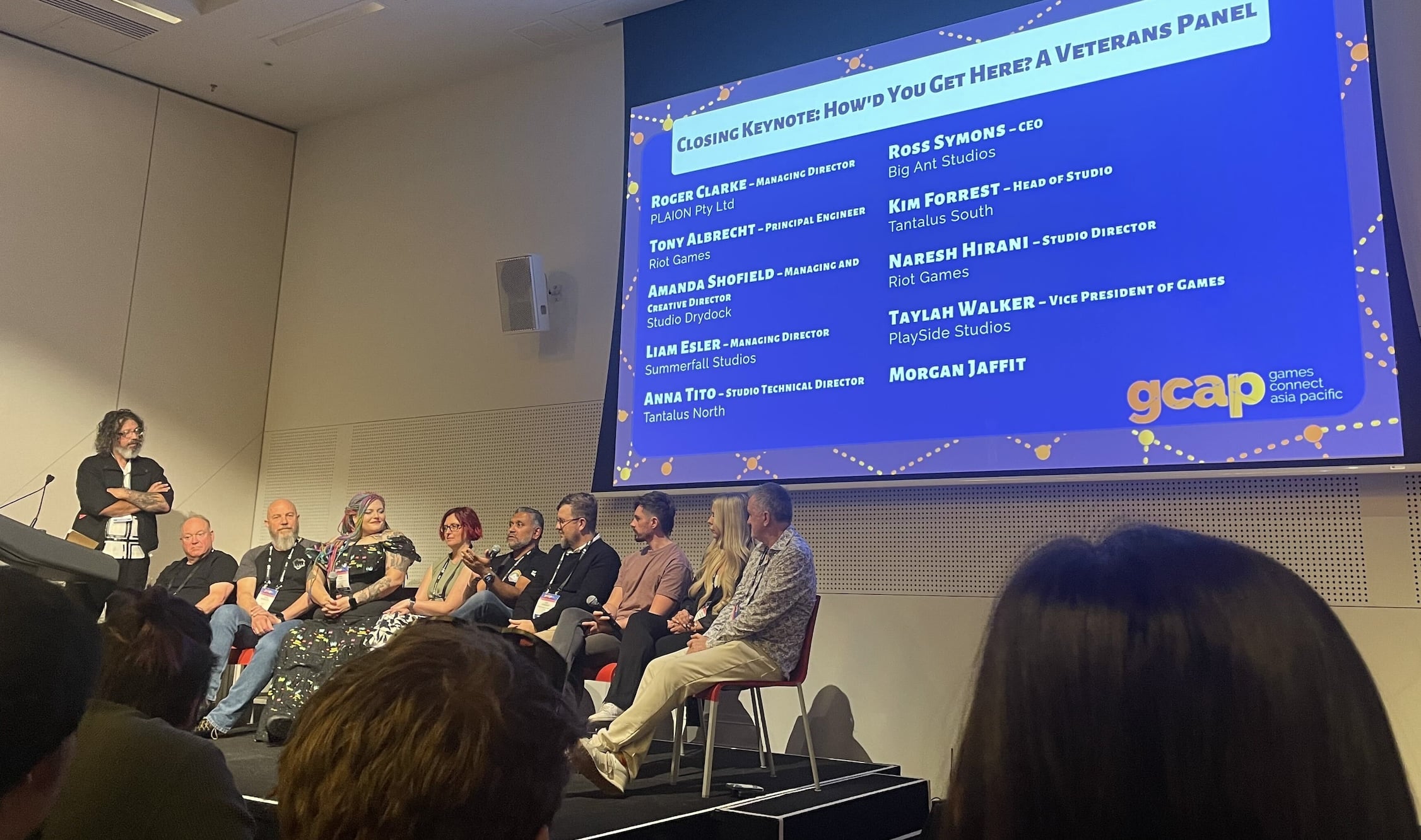On the floors of GCAP 2024, there were whispers everywhere – of secretive company layoffs, impending changes to come, and an uncertain future approaching. There was a noticeable downturn from the mood of past years. Elements of gloom and doom. But beyond it all, there was also a real sense of defiance. One that was felt across a range of panels, in keynote talks, in discussions with developers, and on the Australia Game Developer Awards (AGDAs) dance floor.
Nothing can stop developers dancing – even when it feels like the world is falling apart.
The economic reality of the games industry was not shied away from at GCAP 2024. Worldwide, we’re seeing a shrinkage, after years of expansion. Why is it happening? The answer is incredibly complex, and unique to each company. But it’s fair to say broadly, the games industry is realigning itself after a brief coronavirus-induced boom, while contending with global economic downturn.
In a so-called cost of living crisis, where housing and even grocery prices are growing rapidly more expensive, luxury goods are no longer viable purchases. Video games are one of the first things to be chopped off the shopping list when it comes to survival, and there’s no doubt that downturn is having an impact on sales of games.
There’s other issues, of course. Social media and internet algorithms are becoming increasingly difficult to navigate, with these often serving the same kinds of games and experiences, while effectively burying newer, more exciting titles. The cost of living crisis inspires a time deficiency for those required to work longer hours. In pursuit of endless growth, some companies are also making needless cuts, or attempting to replace hard-working folks with far less capable AI.
Whatever the core reason, the crux is this: the games industry is growing smaller, folks are losing jobs, and there’s now far less stability in games careers.
Read: Should you still pursue a career in the games industry?
But even amongst all that, developers remain defiant, and determined to fight for a brighter future – one where adaptation and quick thinking will be key.
Adapt to a changing world

Australia’s local games market has always been uniquely positioned against a global backdrop. With the support of government funding bodies – VicScreen, Screen Queensland, Screen Australia, Screen NSW, and so on – a range of diverse, culturally relevant, and exciting creative projects have been given a layer of security to continue development.
Concurrently, we also have a culture of dogged persistence and built-in adaptation, with developers often working multiple jobs and sharing their expertise with an entire community.
Speaking to developers for a recent piece about the state of the industry, common threads emerged around pathways into game development in Australia. While interviewees agreed that established developers have an easier time finding work, what was most clear is that the art of finding a job remains fundamentally the same: it’s all about getting creative.
Read: Tales of the Shire has taught ample lessons in leadership
That means finding work where possible, and relying on a tangible network of supporters to find opportunities to contribute art, writing, coding, and design where possible. It’s all hands on deck, and even from the outside, it’s easy to see the sense of community that’s baked into Australia’s local games industry. It’s allowed creative game development to continue readily, even in dire circumstances.
While developers speaking to GamesHub all expressed a variety of concerns about the games industry currently, there was a prevailing hope for the future. At GCAP 2024, many of the talks focussed on this topic – if not directly, through their asides.
Speakers hinted at various troubles in either their own recent redundancies, in having to diversify their skillsets and jobs, or in having games cancelled. But even in speaking about these challenges, developers revealed a core stubbornness. As the road gets tougher, they’re still going to be out there making games.
Why do developers make games?

In multiple talks at GCAP 2024, developers shared their love for making video games, and the impact their work can have. There is a notable compulsion to tell stories, in any way they can. Sometimes these stories are fun and silly. Sometimes they’re culturally relevant, and reveal facets of identity.
In all the stress about careers and potential job losses, Australia’s developers were clear: you can’t stop video games. You can’t stop developers. They will always find a way to make it work.
Read: First Nations representation in games must be paired with agency
On a veterans panel, multiple stalwarts of the industry acknowledged just how much working in video games has changed over the last few years. Jobs are harder to corral. More skills are needed. There’s constant technology change that encourages consistent learning. It’s simply not the same industry they entered, and therefore much of the advice they shared was either no longer applicable, or to be taken alongside personal experience.
But even in saying this, folks like Liam Esler of Summerfall Studios and Ross Symons of Big Ant Studios expressed a hope for the future. That it will be better and brighter than what’s come before – because the developers of today are so much more resilient and innovative, as a result of changed circumstances.
Change is inevitable, and the games industry will continue to change even from here. Whether good or bad is yet to be determined – but regardless of the outcome, GCAP 2024 made it very clear that Australia’s local developers will be there to meet the challenge.





